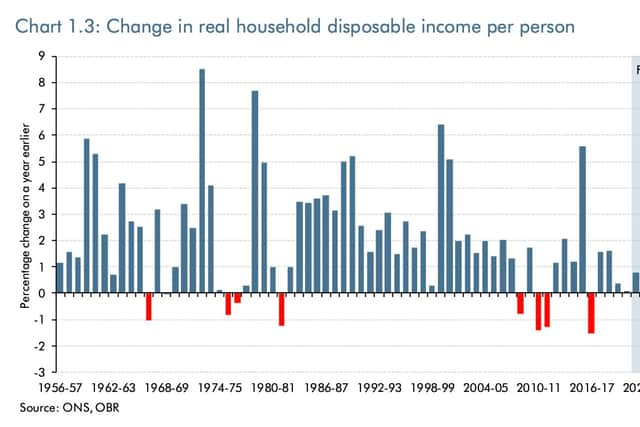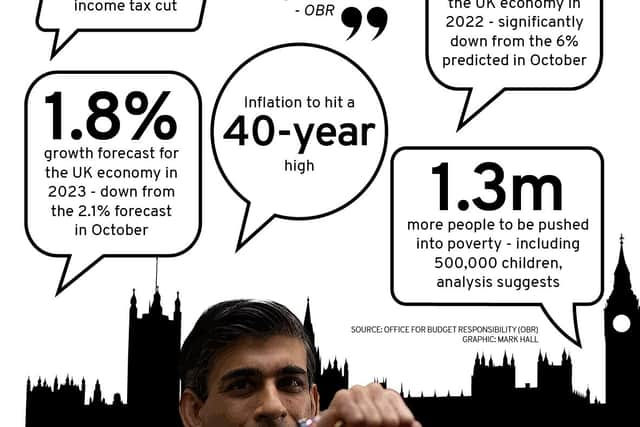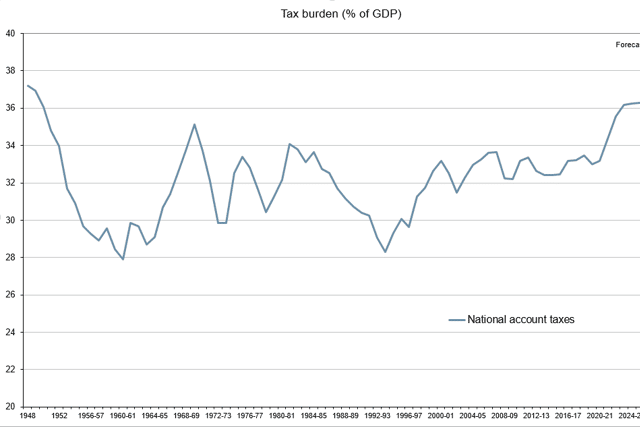Spring Statement 2022: 6 grim stats about the UK’s cost of living crisis - from inflation to energy bills
This article contains affiliate links. We may earn a small commission on items purchased through this article, but that does not affect our editorial judgement.
and live on Freeview channel 276
Rishi Sunak has delivered his Spring Statement, in which he cut fuel duty by 5p and raised the threshold at which people start paying National Insurance by £3,000.
However, the Chancellor has been heavily criticised from all sides for not doing more to help hard-pressed people across the UK facing rising energy bills, rising prices and rising taxes.
Advertisement
Hide AdAdvertisement
Hide AdFollowing the Spring Statement, here are some alarming stats from the Office for Budget Responsibility (OBR), which provides independent analysis of the UK’s public finances and scrutinises tax and welfare policies, and think tanks, about the UK’s cost of living crisis.


The biggest fall in living standards since 1950s
The OBR forecasts that real household disposable income will fall by 2.2% in 2022-23, which they say is the “biggest fall in living standards in any single financial year since Office for National Statistics (ONS) records began in 1956-57.”
The forecast from the OBR adds that it “now expects household post-tax incomes adjusted for inflation to start falling in Q2 2022” and that they are not expected to recover to the same level as early 2022 until Q3 2024.


Inflation will hit a 40-year high
The OBR predicts that inflation, which has just hit a 30-year high of 6.2%, is likely to peak at a 40-year high of 8.7% in the final quarter of 2022.
Advertisement
Hide AdAdvertisement
Hide Ad“This is much higher than the peak of 4.4% that was forecast in October 2021,” it adds.
Loading....
UK’s economic growth slows
The OBR has revised down its growth forecast for the UK economy from October’s forecast, which put 2022 growth at 6%, to just 3.8%.
For 2023, October’s forecast predicted 2.1% growth. This has now been revised now down to 1.8%.


Tax burden will grow - even after the income tax cut
The Chancellor announced that a cut in income tax from 20% to 19% is coming in 2024.
Advertisement
Hide AdAdvertisement
Hide AdHowever, even with this taken into account, the OBR says that Sunak will add 3.3% to the tax burden as a percentage of GDP.
By 2026/27 that will be the biggest tax burden since the late 1940s - up from 33% in 2019/20 to 36.3%.


Energy bills to hit £2,800 a year
The OBR has also forecast that household energy bills will rise to about £2,800 a year from October when the price cap on standard tariffs is likely to rise again by a record £830.
A typical household already faces a hike of about £690, or 54%, to £1,971 a year from 1 April when Ofgem’s energy cap increases.
Advertisement
Hide AdAdvertisement
Hide AdIn its Economic and Fiscal Outlook, the OBR forecasts that an even bigger increase is expected when the price cap is next updated in the autumn.
1.3m more people pushed into poverty
A new analysis from think tank the Resolution Foundation suggests that 1.3 million people, including 500,000 children, will be pushed into absolute poverty in the next financial year - the first time the UK has seen such an increase at this scale outside of a recession.
Speaking to the BBC’s Today programme, Torsten Bell said: "It means we’re all getting worse off, and at the bottom end you’re having to cut essentials because you don’t have lots of luxury spending to go in the first place. I think that is really serious."
A message from the editor:
Thank you for reading. NationalWorld is a new national news brand, produced by a team of journalists, editors, video producers and designers who live and work across the UK. Find out more about who’s who in the team, and our editorial values. We want to start a community among our readers, so please follow us on Facebook, Twitter and Instagram, and keep the conversation going. You can also sign up to our email newsletters and get a curated selection of our best reads to your inbox every day.
Comment Guidelines
National World encourages reader discussion on our stories. User feedback, insights and back-and-forth exchanges add a rich layer of context to reporting. Please review our Community Guidelines before commenting.
